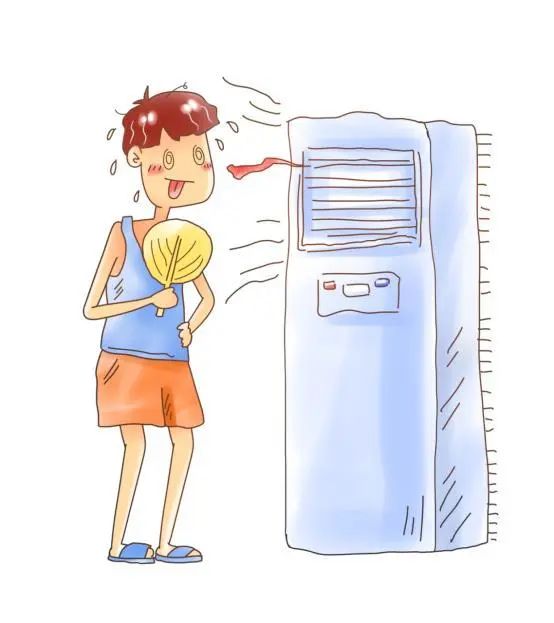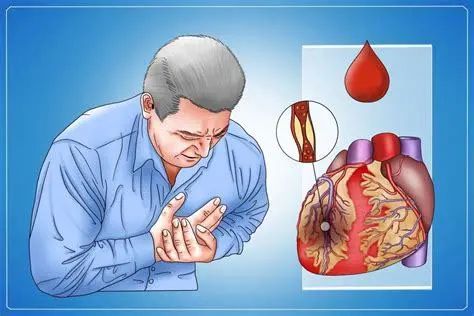It is well known that the cold winter is the high incidence of myocardial infarction, but few people know that in the hot summer hospital admitted angina attack, acute myocardial infarction patients will also reach a small peak.
When is a heart attack likely to occur?
People with high blood pressure, high blood fat or high blood sugar and other high-risk factors are at risk of heart attack when the following conditions occur:
- When sweating profusely: On hot sunny days, outdoor workers sweat profusely and sweat too much, which leads to a reduction of blood volume in the body, aggravating ischemia in the originally narrowed coronary arteries, making them prone to angina pectoris and even myocardial infarction.
- Hot and cold: from the air-conditioned house to the high temperature outdoors, or exercise after taking a cold shower, the sudden change in temperature, the original atherosclerosis of the blood vessel elasticity deterioration, unable to face the sudden contraction and diastole, so that the heart pumping restricted, resulting in myocardial ischemia aggravated.
- Emotional ups and downs: high temperatures make people anxious, irritable, irritable and other excessive emotions will lead to large fluctuations in blood pressure, which is also one of the triggers of myocardial infarction.
- Late night snacks: night to eat barbecue, drink beer, greasy diet to make blood fat, drinking alcohol leads to blood viscous, coupled with the summer days are long and nights are short, people’s sleep time is often insufficient or poor quality of sleep, which in turn causes acute myocardial ischemia induced myocardial infarction.

Heart attack precursors can have these symptoms:
-Angina
Angina is the most typical and common symptom of heart attack! Daily in physical labor, emotional excitement when the abnormal chest pain symptoms, after rest can be relieved. However, it may be a precursor to a heart attack, so be on high alert.
-Worsening and recurring symptoms
If you suffer from coronary heart disease or angina pectoris and find that the number of episodes of chest tightness or chest pain increases abnormally, and the symptoms become more and more serious and are not easily relieved, you need to be alert to the possibility that a heart attack is coming.
-Unknown causes of panic and chest tightness
People who do not have cardiovascular disease, suddenly chest tightness, panic and other discomforts, or there is no activity also breathlessness, dyspnea, need to be vigilant may be due to myocardial ischemia.
-Dizziness, fatigue, palpitations
Stay up late after an unusual weakness, palpitations, dizziness and other symptoms, but also need to be vigilant may be the cardiovascular system issued a distress signal.
-Darkness or fainting
Fainting in patients with heart disease is caused by insufficient blood supply to the brain due to slow or fast heartbeat, and once found, it is necessary to seek medical treatment immediately to avoid delaying the best time for treatment.

How to prevent myocardial infarction in summer:
Avoid staying outdoors for a long time: hot weather should reduce the length of outdoor activities, especially the elderly suffering from coronary heart disease, the ability to regulate body temperature is weak, prolonged exposure to high temperatures can easily lead to increased blood pressure induced myocardial infarction and other consequences.
Supplementary water, reasonable diet: drink more boiled water, eat small meals, to light, low-fat, easy to digest, rich in vitamins and proteins, eat more fresh vegetables and fruits, moderate consumption of lean meat, fish and so on. Try to drink less cold beer, avoid drinking strong alcohol, avoid overeating.
Appropriate static and avoid sitting for a long time: prolonged sedentary will slow down the blood flow, back to the heart of the blood flow is reduced, then if you suddenly get up and move, it is easy to make the coronary artery blood flow to the sudden decrease and lead to the onset of the disease.
Avoid overwork: excessive fatigue, emotional excitement, after a full meal, poor sleep or continuous stress work can induce acute infarction.
Moderate exercise: In terms of exercise programs, aerobic exercise such as slow walking, jogging and swimming is the best choice. In terms of exercise time, it is usually no more than 30 minutes; when it is hot outdoors, especially for the old and weak, it is necessary to reduce physical activities and avoid going to places with high temperature, high humidity and dense population.
Maintain emotional stability: Good mood and mentality are very important for the prevention and treatment of cardiovascular and cerebrovascular diseases. Stuffy weather, crowded and noisy, make people easily irritable, and emotional tension, out of control easy to induce cardiovascular and cerebrovascular diseases. Elderly people suffering from cardiovascular and cerebrovascular diseases should pay attention to maintain a calm state of mind.
“Three high” patients adhere to the medication: some people think that summer eating light, blood pressure and blood fat will be reduced, you can stop taking medication, this view is wrong. Antihypertensive, lipid-lowering drugs at the same time have anti-atherosclerosis, plaque stabilization, etc., can not arbitrarily increase or decrease or stop taking, adjusting the drug to follow the doctor’s instructions.



